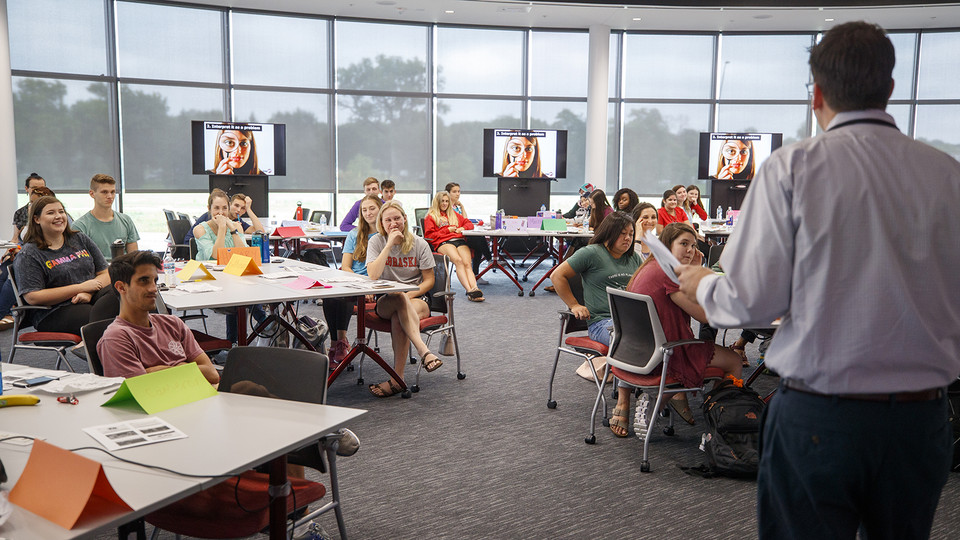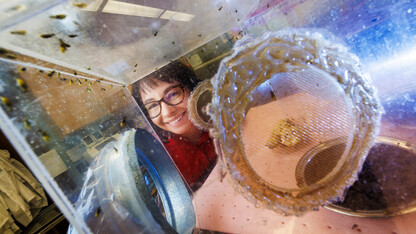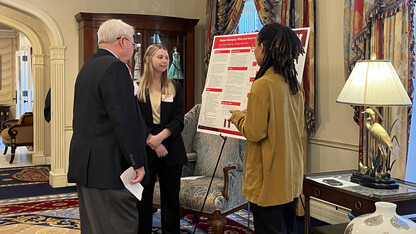· 5 min read
Nebraska launches new bystander intervention training program

A nationally-recognized, award-winning bystander intervention program will help Huskers find their voice and be proactive in assisting others through troubling situations.
Launched this fall at the University of Nebraska–Lincoln, the Step Up program is a training framework that can be adapted to address a number of concerns related to sexual violence, including high-risk drinking, relationship abuse, mental health and discrimination. Facilitated by Big Red Resilience and Well-Being, the instruction is available to students, faculty and staff across all university colleges, organizations and groups.
The first cohort of nearly 40 students — well-being coaches and ambassadors in the Big Red Resilience and Well-Being program — are completing the initial 90-minute training this week.
“Integrating Step Up into our systems is key to helping create a culture of caring across the university,” said Susanne Williams, coordinator of alcohol and other drug prevention programs through Big Red Resilience and Well-Being. “It’s a program that will help our community be prepared and confident in knowing how to safely recognize when and how to safely and effectively help each other.”
Step Up was created by Becky Bell, associate athletic director at University of Arizona, in collaboration with the National Collegiate Athletic Association, National Association of Student Affairs Professionals, University of Virginia and University of California, Riverside. The program, which is regularly evaluated and updated by researchers to gauge and improve its impact, is available at no charge to universities.
Program goals are to raise awareness on how to help others; increase motivation to lend a hand in difficult situations; develop skills and confidence in how to respond to problems or concerns; and to ensure the safety and well-being of all parties involved.
“The training puts you through a number of situations where you recognize that something feels off or wrong,” Williams said. “It examines how individuals can and should respond depending on the severity of each situation.
“It’s comprehensive training that gives you the confidence to know what to do, what to say and how to get help when it is truly necessary.”
The program was endorsed by the NCAA in 2008 and training materials were made available to all life skills coordinators in university athletic departments nationwide. It also received a NASPA gold award and was named a “Best Practice” by the NCAA’s Sports Science Institute of national and international scholars.
Nebraska’s selection of Step Up was made through a collaborative process of evaluation and discussion between campus partners representing Student Affairs, athletics and the Department of Psychology.
“There have been a number of pockets on campus offering bystander training through the years, but — we believe — this is the first time that it has been unified under a single collaborative effort,” Williams said. “It’s proven to be effective and it dovetails nicely with our efforts to create a more compassionate, welcoming and — ultimately — a safer campus.”
Big Red Resilience and Well-Being leaders have set a goal to expand the number of Step Up facilitators on campus (there are 10 currently) and have at least 500 students, faculty and staff complete the initial 90-minute training in this first year. A campus-specific assessment of the program will be measured by David DiLillo and Sarah Gervais, both faculty within Nebraska’s Department of Psychology who conduct federally-funded research into bystander intervention.
A process to request Step Up training is being developed and will be made available to the entire campus community. The university will also host a visit by Bell in the spring semester.
“Results reported from other participating campuses have been very impressive in terms of improving personal responsibility and increasing the likelihood of someone intervening at a time when needed,” Williams said. “The opportunity for this to change the culture on campus is exciting and we’re confident that this is the direction to take the university.”
The new Step Up training is one of a number of opportunities for students, faculty and staff to learn about campus programs and how to provide support when needed. Other training programs and resources available prior to the start of the fall semester include:
Title IX training for all new incoming students and all athletic team members.
Safety on Campus presentations during Big Red Welcome.
A Husker Campus Guide mobile app that creates a single resource for programs and services on campus, including those related to sexual and intimate partner violence.
Workshops for all residence hall assistants on how to respond to reports of sexual violence.
Sexual prevention and bystander training for all new members of fraternities and sororities.
Parents of all new fraternity and sorority members will receive a letter outlining sexual consent with details on how to discuss the issue with students.
Ally training workshops led by the LGBTQA+ Resource Center.







